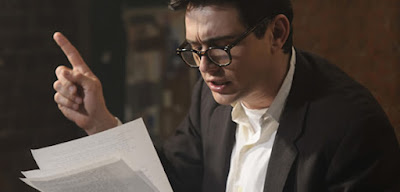Howl Screening + Poetry Panel

Every line in Howl (the movie) is taken from actual sources: Allen Ginsberg's first reading of the poem in 1955, interviews he gave later, and the 1957 obscenity trial, in which publisher Lawrence Ferlinghetti was acquitted, despite the best attempts of the prosecution and various New Critics to deride the work as obscene, objectionable, lacking in "opportunity," and just plain awful. After a screening sponsored by the Poetry Society of America last night at the Angelika, three poets spoke in different ways about their relationship to Ginsberg and the poem.
Mark Doty recounted how at each of his three meetings with Allen Ginsberg, he encountered a new persona: in 1969, he saw the poet as spokesperson; sometime in the 1970s, at a frat party (!), he saw the poet as confessor; and in the 1990s, Doty saw that both Ginsberg and Howl (the poem) had become entertainment in a broad tradition of "Jewish transcendental comedy." The lines, Doty said, still retain the dirty, rageful, hilarious facets they had at the poem's debut 55 years ago. Indeed, James Franco, somehow, fully inhabits Ginsberg's comic nebbishiness, down to a faint jazzy buzz in his voice.
Less prepared, Eileen Myles began by praising the movie, particularly Franco, whose good looks allowed "Allen [to be] played by Allen's desire." Speaking of desire, she mentioned how at their first meeting Ginsberg tried to set her up with his long-term partner, Peter Orlovsky, in part because Ginsberg thought Myles was a boy. She praised the movie's animated bits (!!); it's true that without the cartoons the movie would be pretty short (scenes toggle between the first reading, an extended interview, and the trial) and pretty talky (while we see Franco as Ginsberg interacting with Kerouac and Cassady, these men don't speak).
The evening concluded with a bit of rambling from Anne Waldman, whom Ginsberg referred to as his "spiritual wife." She talked less about being a woman in this man-centric circle and more about all the people she and Ginsberg got to teach at Naropa. But Waldman spoke meaningfully about the way Howl was a "breakthrough in greater candor," a point the movie admirably drives home as well.
Photo: thanks
I love
Comments
Post a Comment